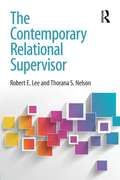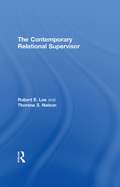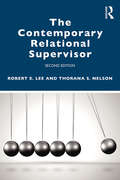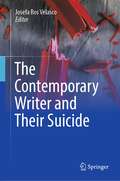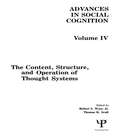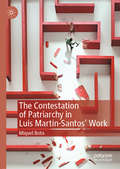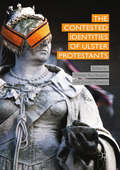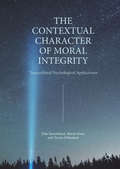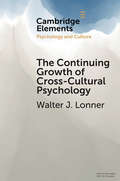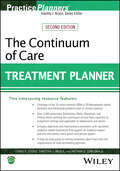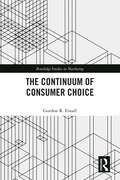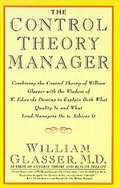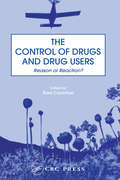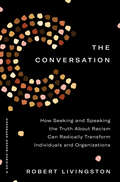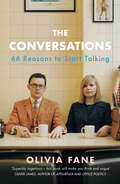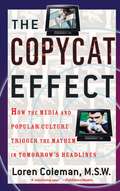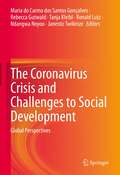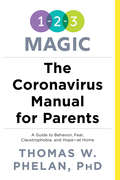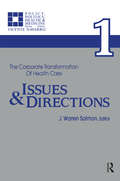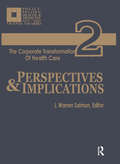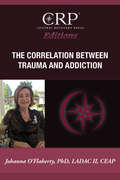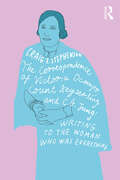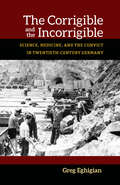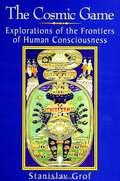- Table View
- List View
The Contemporary Relational Supervisor
by Robert E. Lee Thorana NelsonAppropriate for master's and doctoral level students, as well as experienced clinicians who wish to learn about supervision, the text emphasizes system and relational thinking and intervention, while privileging the diversity of training system members, their realities, experiences, and interpretations of life.
The Contemporary Relational Supervisor
by Robert E. Lee Thorana S. NelsonThe Contemporary Relational Supervisor is an empirically based, academically sophisticated, and learner-friendly book on the cutting edge of couple and family therapy supervision. Appropriate for master’s and doctoral level students, as well as experienced clinicians who wish to learn about supervision, it emphasizes system and relational thinking and intervention, while privileging the diversity of training system members, their realities, experiences, and interpretations of life.The authors are attuned throughout the text to how and where clinical training and services are provided, and to whom, and provide detailed literature reviews for readers. These factors assist their discussion of the socio-historic development of the AAMFT supervision designation, and the fundamentals, contexts, philosophy, relationships, and pragmatics of CFT supervision. They also discuss major models and approaches, evaluation, ethical and legal issues, and therapist development. Perhaps most important is their presentation of methods that help tailor and extend supervision practices to meet the clinical, institutional, and economic realities that CF therapists navigate.Readers are engaged by the discussions and exercises at the end of each chapter, which help them to feel more grounded in a topic, to have their own voices heard, and to be granted insight through experiencing multiple realities. This valuable reference prepares the next wave of cutting-edge CFT supervisors–those who are knowledgeable, skilled, and realistically confident.
The Contemporary Relational Supervisor 2nd edition
by Robert E. Lee Thorana S. NelsonThe Contemporary Relational Supervisor, 2nd edition, is an empirically based, academically sophisticated, and learner-friendly text on the cutting edge of couple and family therapy supervision. This extensively revised second edition provides emerging supervisors with the conceptual and pragmatic tools to engage a new wave of therapists, helping them move forward together into a world of highly systemic, empirically derived, relational, developmental, and integrative supervision and clinical practice. The authors discuss major supervision models and approaches, evaluation, ethical and legal issues, and therapist development. They present methods that help tailor and extend supervision practices to meet the clinical, institutional, economic, and cultural realities that CFT therapists navigate. Filled with discussions and exercises to engage readers throughout, as well as updates surrounding telehealth and social justice, this practical text helps emerging therapists feel more grounded in their knowledge and develop their own personal voice. The book is intended for developing and experienced clinicians and supervisors intent on acquiring up-to-date and forward-looking, systemic, CFT supervisory mastery.
The Contemporary Writer and Their Suicide
by Josefa Ros VelascoThis volume is the continuation of the book Suicide in Modern Literature, edited by Josefa Ros Velasco. Considering the positive reception of this book, Ros Velasco launches the second part, entitled The Contemporary Writer and their Suicide. This time, leading representatives of various disciplines analyze the literary, philosophical, and biographical works of contemporary writers worldwide who attempted to commit suicide or achieved their goal, looking for covert and overt clues about their intentions in their writings. This book aims to continue shedding light on the social and structural causes that lead to suicide and on the suicidal mind, but also to show that people assiduous to writing usually reflect their intentions to commit suicide in their writings, to explain how these frequently veiled intentions can be revealed and interpreted, and to highlight the potential of artistic, philosophical, and autobiographical writing as a tool to detect suicidal ideation and prevent its consummation in vulnerable people. This book analyzes several case studies and their allusions to their contexts and the socio-structural and environmental violence and pressures they suffered, expressions of their will and agency, feelings of dislocation between the individual, reality, and existential alienation, and literary styles, writing techniques, and metaphorical language.
The Content, Structure, and Operation of Thought Systems: Advances in Social Cognition, Volume Iv (Advances in Social Cognition Series #Vol. 4)
by Robert S. Wyer Thomas K. SrullIf anyone deserves the title "father of social cognition," it is William J. McGuire who, along with his wife and colleague Claire V. McGuire, has written the target article for this volume. The culmination of many years of work, the article discusses their highly developed theory of human thought systems, and establishes many new directions for theoretical and empirical inquiry. Equally important, however, are the chapters -- written from many different theoretical and empirical perspectives -- that challenge various assumptions underlying the McGuires' work. In addition to examining implications not explicitly considered in the target article, these contributions explore the new directions that future research and theorizing might take.
The Contestation of Patriarchy in Luis Martín-Santos' Work
by Miquel BotaThis book proposes that Spanish author Luis Martín-Santos’ work focuses on the effects of patriarchy and hegemonic masculinity on men, to actively contribute to freeing both men and women from the yoke of patriarchy. It aims for a new resonance of Luis Martín-Santos. It analyzes the influence of Heidegger, Freud and Sartre in Martín-Santos’ psychiatric essays and his fictional works: the novel Tiempo de silencio (Time of Silence), the collection of short stories Apólogos, and the posthumous fragment Tiempo de destrucción (Time of Destruction). It demonstrates that alongside the political critique of Franco’s dictatorship, Martín-Santos’ creative writings are an attempt to destroy the prevalent masculine myths of Western patriarchy, and a proposal to create new myths for the future.
The Contested Identities of Ulster Protestants
by Thomas Paul Burgess Gareth MulvennaThis study explores the idea voiced by journalist Henry McDonald that the Protestant, Unionist and Loyalist tribes of Ulster are '. . . the least fashionable community in Western Europe'. A cast of contributors including prominent politicians, academics, journalists and artists explore the reasons informing public perceptions attached to this community.
The Contextual Character of Moral Integrity: Transcultural Psychological Applications
by Dita Šamánková Marek Preiss Tereza PříhodováThis book discusses outcomes of a study by the National Institute of Mental Health, Czech Republic, examining moral integrity in the post-communist Czech-speaking environment. Chapters map the history of the Euro-Atlantic ethical disciplines from moral philosophy and psychology to evolutionary neuroscience and socio-biology. The authors emphasize the biological and social conditionality of ethics and call for greater differentiation of both research and applied psychological standards in today’s globalised world. Using a non-European ethical system – Theravada Buddhism – as a case study, the authors explore the differences in English and Czech interpretations of the religion. They analyse cognitive styles and language as central variables in formatting and interpreting moral values, with important consequences for cultural transferability of psychological instruments. This book will appeal to academics and other specialists in psychology, psychiatry, sociology and related fields, as well as to readers interested in the psychology of ethics.
The Continuing Growth of Cross-Cultural Psychology: A First-Person Annotated Chronology (Elements in Psychology and Culture)
by Walter J. LonnerThis Element describes noteworthy developments in cross-cultural psychology of the past half century. It stresses the author's involvement with the Journal of Cross-Cultural Psychology and the International Association for Cross-Cultural Psychology. It presents events in a decade-by-decade format, allowing brief discussion of high points in each decade, such as significant conferences and books, and commentaries on selected scholars. Topics include summaries of IACCP conferences, Online Readings in Psychology and Culture, IACCP Archives, and assessment of introductory psychology texts and their cultural content. Key aspects of culture-centered methodology in psychology and the teaching of culture-oriented psychology conclude the presentation.
The Continuum of Care Treatment Planner (PracticePlanners)
by Timothy J. Bruce Arthur E. Jongsma Jr. Chris E. StoutCreate customized formal treatment plans with over 1,000 professional goal and intervention statements The Continuum of Care Treatment Planner offers clinicians a timesaving, evidence-based guide that helps to clarify, simplify, and accelerate the process of planning treatments for adults and adolescents. The authors provide a thorough introduction to treatment planning, along with the elements necessary to quickly and easily develop formal, customizable treatment plans. Treatment planning statements satisfy the demands of HMOs, managed-care companies, third-party payers, and state and federal agencies.This planner provides treatment planning components foranxiety, bipolar disorder, depression, eating disorders, posttraumatic stress disorder, substance use disorders, and beyond. Following the user-friendly format that has made the Treatment Planners series so popular, this book smooths the planning process so you can spend less time on paperwork and more time with clients. Get definitions, treatment goals and objectives, therapeutic interventions, and DSM-5 diagnoses for mental disorders in adults and adolescents Employover 1,000 polished goals and intervention statements as components of provider-approved treatment plans Use workbook space to record customized goals, objectives, and interventions Access a sample plan that meets all requirements of third-party payers and accrediting agencies,including the JCAHO This updated edition of The Continuum of Care Treatment Planner is a valuable resource for psychologists, therapists, counselors, social workers, psychiatrists, and other mental health professionals who work with adult and adolescent clients.
The Continuum of Consumer Choice (Routledge Studies in Marketing)
by Gordon R. FoxallHuman consumption is multi- faceted and so requires inter- disciplinary exploration in order to explain a spectrum of experiences that is at once particular and allpervading. Consumer choice is a microcosm of human activity which transcends the purview of the archetypal marketing or consumer psychology textbook. Its perspective is that of social science itself. This book understands the study of consumer choice as a paradigm of human socio- economic activity and seeks further understanding of its socio- economic and philosophical bases.The Continuum of Consumer Choice provides a novel view of consumer choice based on the temporal horizon of the consumer, giving rise to a spectrum of consumption styles from the everyday to the extreme. The focus is on explaining this continuum in behavioral, cognitive, and neurophysiological terms, affording the reader a unique perspective on the intellectual basis of consumer psychology and marketing. The reader gains insight into a critical combination of economic psychology, neurophysiology, and philosophy, which contributes to establishing marketing and consumer research as scholarly academic pursuits. The book’s particular focus is the proper place and form of an intentional (cognitive and perceptual) explanation of consumer choice.This is an essential monograph for advanced students in consumer psychology and marketing as well as for researchers in these areas. It is particularly relevant to marketing and consumer theory, providing appreciation of their scholarly foundations. It also appeals to students, lecturers, and researchers in social science generally who are alert to the intellectual potential of consumer psychology and marketing as contributors to a full understanding of human behavior and experience.
The Control Theory Manager
by William GlasserCombining the control theory of William Glasser with the wisdom of W. Edwards Deming, this indispensable management resource explains both what quality is and what lead-managers need to do to achieve it.
The Control of Drugs and Drug Users: Reason or Reaction?
by Ross CoomberInformed debate on how, why, or even if, drugs and those that use them should be controlled needs an insight into the background of such controls, how effective they have been and what reasonable alternatives there may be. This book seeks to provide such an insight. Reviewing important aspects of past and current drug control policies in Britain and America, the international compliment of expert contributors seek to explore the rationality of the reasoning which produced the initial controls, the continuing relevance of those currently employed, and provide alternative scenarios for future policy.
The Conversation: How Seeking and Speaking the Truth About Racism Can Radically Transform Individuals and Organizations (Core Teachings Of Dalai Lama Ser.)
by Robert LivingstonAn essential tool for individuals, organizations, and communities of all sizes to jump-start dialogue on racism and bias and to transform well-intentioned statements on diversity into concrete actions—from a leading Harvard social psychologist.&“Livingston has made the important and challenging task of addressing systemic racism within an organization approachable and achievable.&”—Alex Timm, co-founder and CEO, Root Insurance CompanyHow can I become part of the solution? In the wake of the social unrest of 2020 and growing calls for racial justice, many business leaders and ordinary citizens are asking that very question. This book provides a compass for all those seeking to begin the work of anti-racism. In The Conversation, Robert Livingston addresses three simple but profound questions: What is racism? Why should everyone be more concerned about it? What can we do to eradicate it? For some, the existence of systemic racism against Black people is hard to accept because it violates the notion that the world is fair and just. But the rigid racial hierarchy created by slavery did not collapse after it was abolished, nor did it end with the civil rights era. Whether it&’s the composition of a company&’s leadership team or the composition of one&’s neighborhood, these racial divides and disparities continue to show up in every facet of society. For Livingston, the difference between a solvable problem and a solved problem is knowledge, investment, and determination. And the goal of making organizations more diverse, equitable, and inclusive is within our capability.Livingston&’s lifework is showing people how to turn difficult conversations about race into productive instances of real change. For decades he has translated science into practice for numerous organizations, including Airbnb, Deloitte, Microsoft, Under Armour, L&’Oreal, and JPMorgan Chase. In The Conversation, Livingston distills this knowledge and experience into an eye-opening immersion in the science of racism and bias. Drawing on examples from pop culture and his own life experience, Livingston, with clarity and wit, explores the root causes of racism, the factors that explain why some people care about it and others do not, and the most promising paths toward profound and sustainable progress, all while inviting readers to challenge their assumptions.Social change requires social exchange. Founded on principles of psychology, sociology, management, and behavioral economics, The Conversation is a road map for uprooting entrenched biases and sharing candid, fact-based perspectives on race that will lead to increased awareness, empathy, and action.
The Conversations: 66 Reasons to Start Talking
by Olivia FaneWe've all known the heady thrill of a conversation that goes on all night. Once we had opinions on everything but as life becomes more humdrum we often lose that passion. Sometimes we can't remember what we really think at all.This brilliant book encourages us all to think anew. Olivia Fane provides the starting points for 66 conversations to be had with a partner, friend, stranger or simply with ourselves. These thought-provoking and stimulating short discussions on happiness, vanity, infidelity, education and more, ask you the questions that will help you get to know those with whom you share your life.Whether you agree or vehemently disagree, The Conversations provides endless food for thought and a surprising window onto some of the big subjects that define who we are and how we live.
The Copycat Effect: How the Media and Popular Culture Trigger the Mayhem in Tomorrow's Headlines
by Loren ColemanVIOLENCE BEGETS VIOLENCE BEGETS VIOLENCE... A disturbed student shoots up his classroom -- and suddenly a wave of mass murder is sweeping through our nation's schools. A young child is taken from her home -- and for months afterward child abductions are frantically reported on an almost daily basis. A surfer is attacked by a shark -- and the public spends an entire summer fearing an onslaught of the deadly underwater predators. Why do the terrible events we see in the media always seem to lead to more of the same? Noted author and cultural behaviorist Loren Coleman explores how the media's over-saturated coverage of murders, suicides, and deadly tragedies makes an impact on our society. This is The Copycat Effect -- the phenomenon through which violent events spawn violence of the same type. From recognizing the emerging patterns of the Copycat Effect, to how we can deal with and counteract its consequences as individuals and as a culture, Loren Coleman has uncovered a tragic flaw of the information age -- a flaw which must be corrected before the next ripples of violence spread.
The Coronavirus Crisis and Challenges to Social Development: Global Perspectives
by Rebecca Gutwald Tanja Kleibl Ronald Lutz Ndangwa Noyoo Maria do Carmo dos Santos Gonçalves Janestic TwikirizeThis book is a novel contribution to academic discourses on the coronavirus (COVID-19) crisis and how it has impacted societies globally. It proffers an overview on the social development and political measures, from both the Global North and Global South, to prevent COVID-19's spread. It illuminates major social, political and economic challenges that already existed in different contexts and which are also currently being amplified by COVID-19. Curiously, this global pandemic has opened spaces for different actors, across the globe, to begin to fundamentally question and challenge the hegemony of the Global North, which sometimes is evident in social work. Linked to the foregoing and while reflecting beyond the pandemic and into the future, the book proposes that social work must become more political at all levels, and strive to transform societies, global social development efforts, and economic and health systems. This contributed volume of 38 chapters discusses and analyses ethical, social, sociological, social work and social development issues that complement and enrich available literature in the socio-political, economics, public health, medical ethics and political science. It provides various case studies which should enable readers to gain insights into how countries have responded to the pandemic and learn how COVID-19 negatively impacted countries in different parts of the world. This book also provides a platform for the articulation of neglected and marginalized voices, such as those of indigenous populations, the poor, or oppressed. The chapters are grouped according to three main themes as they relate to research on the COVID-19 pandemic and social work in Africa, Asia, Europe, Latin America and North America:Analysis: Social Issues and the COVID-19 Pandemic Strategies and Responses in Social Work: Globally and LocallyOutlook: Looking Ahead Beyond the PandemicIntended to engage a global, diverse and interdisciplinary audience, The Coronavirus Crisis and Challenges to Social Development is a timely and relevant resource for academics, students and researchers in inter alia Social Work, Philosophy, Sociology, Economics, and Development Studies.
The Coronavirus Manual for Parents: A Guide to Behavior, Fear, Claustrophobia and Hope-at Home
by Thomas PhelanFrom the internationally bestselling author of 1-2-3 Magic comes The Coronavirus Manual for Parents, a must-have guide for parenting while social distancingDr. Thomas Phelan, renowned clinical psychologist, knows it isn't easy to be stuck at home during these scary times. The kids are restless, anxious, and confused, and frankly, so are you! But Dr. Phelan has broken down the elements of effective parenting during the COVID-19 pandemic into an easy-to-understand program that can bring comfort and joy to any family. Full of useful tips and actionable advice, Dr. Phelan teaches parents: How to manage your kids during strange, tough times Teach your children (and yourself!) how to handle scary information How to avoid turning into a monster under stress Maximize your enjoyment of your kids Spark courage and resilience
The Corporate Transformation of Health Care: Part 1: Issues and Directions (Policy, Politics, Health and Medicine Series)
by Warren J SalmonThe author explores how the corporate transformation of hospitals, HMOs, and the insurance and pharmaceutical industries has resulted in reduction in services, dangerous cost cutting, poor regulation, and corrupt research. He sheds light on the political lobbying and media manipulation that keeps the present system in place. Exposing the shortcomings of reform proposals that do little to alter the status quo, he makes a case for a workable single-payer system. This is an essential read for today's practitioners, policy makers, healthcare analysts and providers, and all those concerned with the precarious state of America's under- and uninsured.
The Corporate Transformation of Health Care: Part 2: Perspectives and Implications (Policy, Politics, Health and Medicine Series)
by J. Warren SalmonThis new volume illuminates the growing corporate in-roads into the health care system and its probable consequences, especially for physicians and other practitioners. Its fourteen contributors examine both the delivery and supply functions in the health sector in America. Ambulatory care, hospitals, health maintenance organizations, and health promotion activities are each critically dissected. A major thrust of the investigations focuses upon implications for the medical profession, principally how the increased scrutiny over clinical decision making by corporate purchasers and payors threatens the traditional role and relative autonomy of physicians. Varying theoretical perspectives are debated, with an additional Canadian perspective offered.
The Corporeal Identity
by Elena FaccioExplorees the cultural origins and psychological aspects of body identity disorders. Discusses the influence of contemporary virtual and cyberspace imagery on self-image. Draws on author's professional experience largely dedicated to exploring disorders wherein body identity is the chosen field for communication and exchange. Re-examines such illnesses as anorexia, bulimia, body dysmorphic disorder, and others
The Correlation Between Trauma and Addiction
by Johanna O'FlahertyA succinct and compelling treatise on the bio-psycho-social effects of trauma, and the connections between trauma and addiction, as well as how these conditions facilitate each other. The challenges of working effectively with those struggling with trauma and co-occurring addiction in treatment settings are presented, along with recommended approaches for those in treatment and early addiction recovery.There is a clear relationship between trauma and addiction. Although addiction is not caused by trauma, and trauma is not caused by addiction, it has become increasingly clear that trauma and addiction frequently go together. Extensive research suggests that approximately 50 percent of people with histories of addiction have experienced trauma.Based on different scientific studies, the percentage of people with both trauma and addiction ranges from about 20 percent to as high as 80 percent, with the figure being somewhat higher for women than for men. The connection between trauma and addiction is a two-way street: trauma increases the risk of developing addiction and active addiction increases the likelihood of experiencing trauma.
The Correspondence of Victoria Ocampo, Count Keyserling and C. G. Jung: Writing to the Woman Who Was Everything
by Craig E. StephensonThe Correspondence of Victoria Ocampo, Count Keyserling and C. G. Jung centres on two pivotal meetings: Victoria Ocampo and Hermann von Keyserling’s in 1929, and Ocampo and Carl Gustav Jung’s in 1934. The first section of the book chronicles these encounters, which proved to be key moments in the lives of the players and had repercussions both private and public. The later sections consist of the correspondence and other writings that preceded and followed these meetings, translated from French, German, and Spanish, much of it for the first time. Jung framed Keyserling’s account of the encounter with Ocampo as "one of the most beautiful animus-anima stories I have ever heard." But that story, told here from the three points of view of the pioneering Argentine intellectual, the Baltic German philosopher, and the Swiss founder of analytical psychology, can also be read in the contexts of early-twentieth-century feminism and of gender and sexual politics, of the colonizing European gaze on the Americas, of Argentina and its cultural complexes, of typological impasses, and of Eros and the power of words. The fraught relationships and power dynamics among three influential figures will be of interest to analytical psychologists, historians of psychological disciplines and of South America, as well as general readers.
The Corrigible And The Incorrigible: Science, Medicine, And The Convict In Twentieth-century Germany
by Greg EghigianThe Corrigible and the Incorrigible explores the surprising history of efforts aimed at rehabilitating convicts in 20th-century Germany, efforts founded not out of an unbridled optimism about the capacity of people to change, but arising from a chronic anxiety about the potential threats posed by others. Since the 1970s, criminal justice systems on both sides of the Atlantic have increasingly emphasized security, surveillance, and atonement, an approach that contrasts with earlier efforts aimed at scientifically understanding, therapeutically correcting, and socially reintegrating convicts. And while a distinction is often drawn between American and European ways of punishment, the contrast reinforces the longstanding impression that modern punishment has played out as a choice between punitive retribution and correctional rehabilitation. Focusing on developments in Nazi, East, and West Germany, The Corrigible and the Incorrigible shows that rehabilitation was considered an extension of, rather than a counterweight to, the hardline emphasis on punishment and security by providing the means to divide those incarcerated into those capable of reform and the irredeemable.
The Cosmic Game: Explorations of the Frontiers of Human Consciousness (SUNY series in Transpersonal and Humanistic Psychology)
by Stanislav GrofIn this, his culminating work, the leading international figure in consciousness research masterfully synthesizes his vast findings, drawing not only upon psychedelic therapy and Holotropic Breathwork, but also from literature, cross-cultural studies, ancient mystical sources and psychological data, resulting in a profound consolidation and articulation of what is now known about nonordinary states of consciousness.The Cosmic Game discusses the broadest philosophical, metaphysical and spiritual insights gleaned in Grof's research concerning human nature and reality, addressing the most fundamental questions human beings have asked about the nature of existence since time immemorial.Insights from research into nonordinary states of consciousness portray existence as an astonishing play of the cosmic creative principle that transcends time, space, linear causality, and polarities of every kind and suggest an identity of the individual psyche in its furthest reaches with the universal creative principle and the totality of existence. This identity of the human being with the Divine is the ultimate secret that lies at the core of all great spiritual traditions."What moves this book into the status of a classic is that it is in substantial agreement with the world's great wisdom and spiritual traditions. This modern corroboration of the perennial philosophy is a stunning achievement and deserves publication to the widest audiences." -- Ken Wilber, author of Up from Eden: A Transpersonal View of Human Evoution and The Atman Project: A Transpersonal View of Human Development"The Cosmic Game is the latest and best of Stanislav Grof's extraordinary contributions to our understanding of human consciousness. This book provides a coherent picture of how individual experience fits into universal patterns of consciousness" -- Frances Vaughan, author of Shadows of the Sacred: Seeing through Spiritual Illusions"Perhaps the most important of all his works, representing as it does an integration of the most profound of his clients' experiences and demonstrating a remarkable convergence with the deepest spiritual experiences reported across centuries and cultures. This convergence is a finding of the greatest significance." -- Roger Walsh, author of The Spirit of Shamanism"Grof is the world's leading authority on the deep exploration of the mind and soul... This is a wonderful gift!" -- Charles Tart, author of States of Consciousness and Psi: Scientific Studies of the Psychic RealmStanislav Grof, MD, is a psychiatrist with more than fifty years of experience in research of nonordinary states of consciousness. He has been Principal Investigator in a psychedelic research program at the Psychiatric Research Institute in Prague, Czechoslovakia; Chief of Psychiatric Research at the Maryland Psychiatric Research Center; Assistant Professor of Psychiatry at the Johns Hopkins University; and Scholar-in-Residence at the Esalen Institute. He is currently Professor of Psychology at the California Institute of Integral Studies, conducts professional training programs in holotropic breathwork, and gives lectures and seminars worldwide. He is one of the founders and chief theoreticians of transpersonal psychology and the founding president of the International Transpersonal Association (ITA). In 2007, he was granted the prestigious Vision 97 award from the Vaclav and Dagmar Havel Foundation in Prague. He is the author and editor of many books, including The Adventure of Self-Discovery: Dimensions of Consciousness and New Perspectives in Psychotherapy and Inner Exploration; Ancient Wisdom and Modern Science; Beyond the Brain: Birth, Death, and Transcendence in Psychotherapy; Human Survival and Consciousness Evolution; and Psychology of the Future: Lessons from Modern Consciousness Research; all published by SUNY Press.
